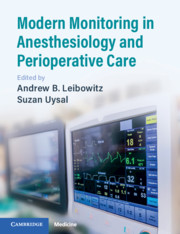Book contents
- Modern Monitoring in Anesthesiology and Perioperative Care
- Modern Monitoring in Anesthesiology and Perioperative Care
- Copyright page
- Contents
- Contributors
- Preface
- Chapter 1 Statistics Used to Assess Monitors and Monitoring Applications
- Chapter 2 Multimodal Neurological Monitoring
- Chapter 3 Cerebral Oximetry
- Chapter 4 The Oxygen Reserve Index
- Chapter 5 Point-of-Care Transesophageal Echocardiography
- Chapter 6 Point-of-Care Transthoracic Echocardiography
- Chapter 7 Point-of-Care Lung Ultrasound
- Chapter 8 Point-of-Care Ultrasound: Determination of Fluid Responsiveness
- Chapter 9 Point-of-Care Abdominal Ultrasound
- Chapter 10 Noninvasive Measurement of Cardiac Output
- Chapter 11 Assessing Intravascular Volume Status and Fluid Responsiveness: A Non-Ultrasound Approach
- Chapter 12 Assessment of Extravascular Lung Water
- Chapter 13 Point-of-Care Hematology
- Chapter 14 Assessment of Intraoperative Blood Loss
- Chapter 15 Respiratory Monitoring in Low-Intensity Settings
- Chapter 16 The Electronic Health Record as a Monitor for Performance Improvement
- Chapter 17 Future Monitoring Technologies: Wireless, Wearable, and Nano
- Chapter 18 Downside and Risks of Digital Distractions
- Index
- Plate Section (PDF Only)
- References
Chapter 15 - Respiratory Monitoring in Low-Intensity Settings
Published online by Cambridge University Press: 28 April 2020
- Modern Monitoring in Anesthesiology and Perioperative Care
- Modern Monitoring in Anesthesiology and Perioperative Care
- Copyright page
- Contents
- Contributors
- Preface
- Chapter 1 Statistics Used to Assess Monitors and Monitoring Applications
- Chapter 2 Multimodal Neurological Monitoring
- Chapter 3 Cerebral Oximetry
- Chapter 4 The Oxygen Reserve Index
- Chapter 5 Point-of-Care Transesophageal Echocardiography
- Chapter 6 Point-of-Care Transthoracic Echocardiography
- Chapter 7 Point-of-Care Lung Ultrasound
- Chapter 8 Point-of-Care Ultrasound: Determination of Fluid Responsiveness
- Chapter 9 Point-of-Care Abdominal Ultrasound
- Chapter 10 Noninvasive Measurement of Cardiac Output
- Chapter 11 Assessing Intravascular Volume Status and Fluid Responsiveness: A Non-Ultrasound Approach
- Chapter 12 Assessment of Extravascular Lung Water
- Chapter 13 Point-of-Care Hematology
- Chapter 14 Assessment of Intraoperative Blood Loss
- Chapter 15 Respiratory Monitoring in Low-Intensity Settings
- Chapter 16 The Electronic Health Record as a Monitor for Performance Improvement
- Chapter 17 Future Monitoring Technologies: Wireless, Wearable, and Nano
- Chapter 18 Downside and Risks of Digital Distractions
- Index
- Plate Section (PDF Only)
- References
Summary
Respiratory monitoring utilizing pulse oximetry and expired carbon dioxide (CO2) measurement has been an operating room standard since the 1980s. Post-anesthesia and intensive care units adopted pulse oximetry shortly thereafter and only recently have embraced expired CO2 monitoring. However, there remains a need for monitoring the respiratory function of patients in low-intensity hospital environments (i.e., other than operating rooms, post-anesthesia care units, or intensive care units), since they frequently experience respiratory compromise that may progress, require tracheal intubation, and may deteriorate to cardiopulmonary arrest. This is especially true in patients with obesity, obstructive sleep apnea, and opioid administration, which are common risk factors. Monitoring for respiratory compromise in low-intensity environments, however, is challenging. This chapter addresses the use of pulse oximetry, expired CO2, photoplethysmography, bioimpedance, and acoustic monitoring in these settings.
- Type
- Chapter
- Information
- Modern Monitoring in Anesthesiology and Perioperative Care , pp. 148 - 153Publisher: Cambridge University PressPrint publication year: 2020

